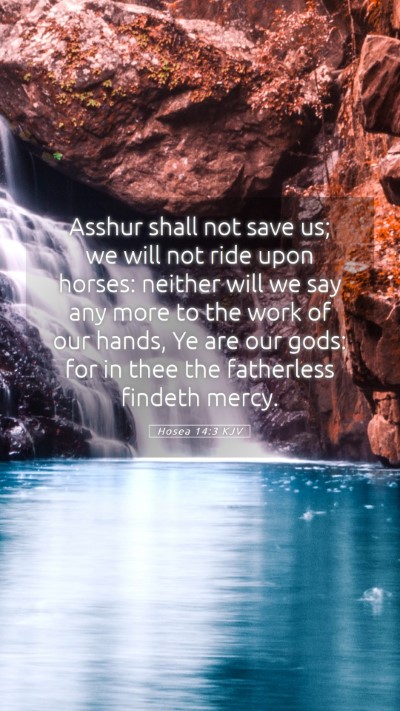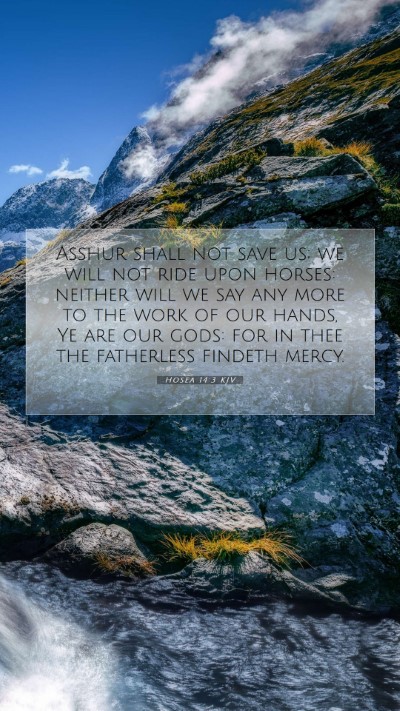Old Testament
Genesis Exodus Leviticus Numbers Deuteronomy Joshua Judges Ruth 1 Samuel 2 Samuel 1 Kings 2 Kings 1 Chronicles 2 Chronicles Ezra Nehemiah Esther Job Psalms Proverbs Ecclesiastes Song of Solomon Isaiah Jeremiah Lamentations Ezekiel Daniel Hosea Joel Amos Obadiah Jonah Micah Nahum Habakkuk Zephaniah Haggai Zechariah MalachiHosea 14:3 Meaning
What is the meaning of Hosea 14:3?
Asshur shall not save us; we will not ride upon horses: neither will we say any more to the work of our hands, Ye are our gods: for in thee the fatherless findeth mercy.
Hosea 14:3 Bible Verse Meaning
Understanding Hosea 14:3
In Hosea 14:3, the scripture reads: "Take with you words, and turn to the Lord: say unto him, Take away all iniquity, and receive us graciously: so will we render the calves of our lips." This verse encapsulates a profound call for repentance, delivering a rich theological and practical message. Below, we will explore its meaning through the lens of various public domain commentaries and provide insights for Bible study.
Verse Breakdown
This verse can be divided into three main components:
- Take with you words - This emphasizes the importance of verbal confession and communication with God.
- Turn to the Lord - This signifies a movement towards God, a turning from sin, which is central to repentance.
- Say unto him... - Here, there is a plea for the removal of sin and an appeal for grace, reflecting a desire for restoration.
Commentary Insights
Using insights from respected theologians:
- Matthew Henry: Henry emphasizes the necessity of coming to God with sincere words, showcasing that repentance involves both confession and a heartfelt return to God. He notes that ‘calves of our lips’ represents our praises and worship, which should be offered as acknowledgment of God’s grace.
- Albert Barnes: Barnes elaborates on the notion of turning to the Lord with prayers and supplications, recognizing that divine mercy is crucial for redemption. He points out that 'taking away iniquity' is essential for establishing a restored relationship with the Lord.
- Adam Clarke: Clarke focuses on the practical application of this verse, stating that the sincere acknowledgment of wrongdoing should lead to genuine worship. He highlights that God desires truth and repentance rather than mere ritualistic sacrifices.
Theological Implications
Hosea 14:3 presents key theological concepts:
- Repentance: Acknowledging sin is the first step towards redemption.
- Grace: The verse underscores God's readiness to accept those who genuinely turn to Him with pleas for mercy.
- Worship: True worship is portrayed not in animal sacrifices but in the sincerity of one’s speech and intentions towards God.
Practical Applications
For modern readers, Hosea 14:3 speaks volumes about how to approach God:
- Engage in verbal confession as part of your prayer life.
- Turn actively towards God by seeking His presence and guidance during difficult times.
- Offer your life and lips in worship as a sign of gratitude for God’s grace and forgiveness.
Related Bible Verses
Hosea 14:3 connects with several other scriptures:
- Psalm 51:17 - “The sacrifices of God are a broken spirit; a broken and contrite heart, O God, thou wilt not despise.”
- 1 John 1:9 - “If we confess our sins, he is faithful and just to forgive us our sins, and to cleanse us from all unrighteousness.”
- Isaiah 57:15 - “For thus saith the high and lofty One that inhabiteth eternity, whose name is Holy; I dwell in the high and holy place, with him also that is of a contrite and humble spirit, to revive the spirit of the humble, and to revive the heart of the contrite ones.”
Conclusion
In summary, Hosea 14:3 serves as a compelling reminder of God’s readiness to forgive and the importance of sincere worship and repentance. Whether for personal study or group discussions in Bible study groups, this verse encourages profound reflection on one’s relationship with God and emphasizes the heart behind the words we offer in prayer and worship.


